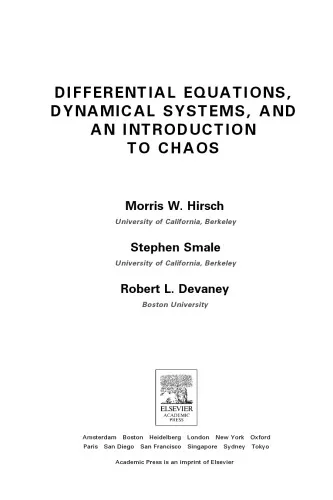Nonlinear Dynamical Systems and Control: A Lyapunov-Based Approach
4.5
Reviews from our users

You Can Ask your questions from this book's AI after Login
Each download or ask from book AI costs 2 points. To earn more free points, please visit the Points Guide Page and complete some valuable actions.Related Refrences:
Introduction to 'Nonlinear Dynamical Systems and Control: A Lyapunov-Based Approach'
In the realm of science and engineering, nonlinear systems represent the majority of real-world phenomena encountered in practice. Their complexity, however, often makes them challenging to analyze and control. The book 'Nonlinear Dynamical Systems and Control: A Lyapunov-Based Approach' addresses this challenge by offering a profound yet accessible framework rooted in Lyapunov theory, paving the way for systematic analysis, stability verification, and robust feedback control design for nonlinear systems.
Detailed Summary of the Book
The book provides a comprehensive and rigorous exploration of nonlinear dynamical systems and feedback control, blending theory, application, and advanced mathematical tools. It delves deep into the concepts of Lyapunov stability theory, offering a unified perspective for designing and analyzing systems even in unpredictable, non-linearized environments. Beginning with foundational principles of nonlinear dynamics, the book establishes the importance of Lyapunov-based methods by extending their scope beyond linear systems.
The structure of the book reflects a logical progression:
- An introduction to basic concepts of stability theory, illustrating their relevance in nonlinear phenomena.
- Development of Lyapunov direct and indirect methods for assessing system behavior.
- Comprehensive discussions on control design strategies using Lyapunov-based analysis.
- Exploration of modern extensions, including robust and adaptive control techniques.
- Challenging examples and real-world applications that bridge theory and practice.
Unlike conventional nonlinear control texts, this book uniquely emphasizes how Lyapunov functions—employed as systematic tools—facilitate precise stability characterization and robust feedback control engineering. As the text progresses, readers are introduced to a range of case studies and applications across mechanical, electrical, aerospace, and biological fields, fostering clarity in transferring theoretical insights to experimental designs.
Key Takeaways
Readers of 'Nonlinear Dynamical Systems and Control: A Lyapunov-Based Approach' will gain valuable insights into several critical aspects of nonlinear system theory and control. Key takeaways include:
- A robust understanding of Lyapunov theory as a universal methodology applicable to diverse and complex systems.
- Practical methods to analyze nonlinear behavior and ensure system stability and safety under various conditions.
- Advanced skills to design nonlinear controllers, including adaptive and robust controllers, crucial in modern engineering applications.
- The ability to bridge theoretical mathematical concepts and their direct implementation in real engineering problems.
- A foundation for pursuing further research into nonlinear systems, modern feedback mechanisms, and emergent dynamics.
Famous Quotes from the Book
The book is known not only for its precise explanations but also for its thought-provoking reflections on nonlinear systems and control. Some notable excerpts include:
"The complexity of the nonlinear world does not yield to intuition alone; it demands systematic tools to understand and control its multifaceted behavior."
"Stability, the cornerstone of system behavior, is not merely a property—it is the bridge between order and chaos."
"Lyapunov’s approach transcends time: a testament to the enduring power of rigorous mathematical reasoning in controlling the unpredictable."
Why This Book Matters
'Nonlinear Dynamical Systems and Control: A Lyapunov-Based Approach' is more than a textbook; it is a guide to mastering the complexities of nonlinear dynamics in an era increasingly defined by the intricacies of modern engineering systems. The book’s relevance lies in its ability to:
- Demystify nonlinear systems, enabling engineers, researchers, and students to confidently design and control complex systems.
- Empower readers by providing a clear, mathematically robust foundation to tackle engineering challenges that lack closed-form solutions.
- Set a benchmark for modern control theory, aligning with industry needs for high-precision control in automation, robotics, and biotechnology.
- Encourage innovation by merging classical stability principles with advanced control practices to solve contemporary problems globally.
In an age where multidisciplinary approaches are increasingly vital, this book offers a unifying framework that combines mathematical rigor, intuitive understanding, and practical implementation. It remains an invaluable asset for professionals and academics alike.
Free Direct Download
You Can Download this book after Login
Accessing books through legal platforms and public libraries not only supports the rights of authors and publishers but also contributes to the sustainability of reading culture. Before downloading, please take a moment to consider these options.
Find this book on other platforms:
WorldCat helps you find books in libraries worldwide.
See ratings, reviews, and discussions on Goodreads.
Find and buy rare or used books on AbeBooks.
1356
بازدید4.5
امتیاز0
نظر98%
رضایتReviews:
4.5
Based on 0 users review
Questions & Answers
Ask questions about this book or help others by answering
No questions yet. Be the first to ask!














